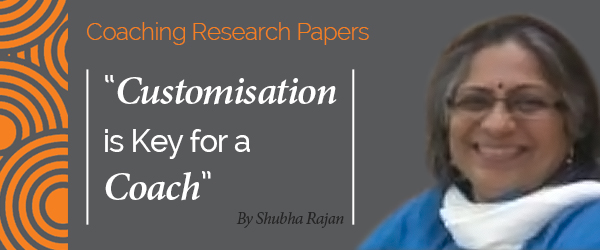Research Paper By Shubha Rajan
(Life Skills Coach, INDIA)
Customised coaching with ASK
Apt Solutions for the Knots in your life
Introduction:
The story goes like this:
a young woman brought her little son to the Mahatma (Gandhi ji) and complained to him that her son was very fond of eating sweets and that his teeth were getting cavities at such a small age. But the boy was willing not to eat sweets if the Mahatma told him not to eat sweets!
Gandhi ji was in a bit of a dilemma. He told the woman to take her son away and come back in ten days time. The woman did that. When she came back after ten days Gandhi ji told the little boy not to eat sweets. The boy agreed. The boy’s mother was a little upset as she had been made to go up and down to her village and come back again. She felt that Gandhi ji could have just said this ten days ago and she would have been done with that one time travel. When she confronted Gandhi ji with this question he replied that he needed to abstain from eating sweets himself and find out if that was possible before he gave direction to the little boy.
This has always been one of the greatest examples of walking the talk and empathy at its best.
This story leads us on to thinking a lot about the golden rule wherein there is a transaction in the human behaviour. It requires mankind to understand itself, the requirement and how one wants to do unto one so that one can reciprocate.
This brought out the realisation that even better is the platinum rule wherein one needs to know what others want and then tailor make the behaviour to that situation. This is a great learning for a coach. So in actual fact all of this is already available in the scriptures, the holy books etc. All educated human beings may have read them and understood the dictates therein, but are they aware enough to follow it. The endeavour is to walk this talk. That is the true coach.
In these times the ICA course curriculum was ongoing there was a lot of conflict in trying to walk the platinum rule talk. Extensive reading on a lot of related topics brought home the powerful saying:
I hear and I forget. I see and I remember. I do and I understand. Confucius
Meanwhile another concept needed practical application – the conscious competence learning matrix. This was going to create the self awareness needed to understand the platinum rule effectively.
In psychology, the four stages of competence, or the “conscious competence” learning model, relates to the psychological states involved in the process of progressing from incompetence to competence in a skill.
Initially described as
Four Stages for Learning Any New Skill,
the theory was developed at the Gordon Training International by its employee Noel Burch in the 1970s.
The Four Stages of Learning provides a model for learning. It suggests that individuals are initially unaware of how little they know, or unconscious of their incompetence. As they recognise their incompetence, they consciously acquire a skill, then consciously use that skill. Eventually, the skill can be done without consciously being thought through, and the individual is said to have unconscious competence.
There is no greater teacher than one’s own life experience and the conscious competence learning matrix was a real eye opener. While one wondered what coaching was all about ( unconscious incompetence) one learned that there is a field called coaching and is a skilful competence to have (conscious incompetence), subsequently one took baby steps and learned all the avenues of a coaching practice (conscious competence) and then worked on to become a great coach ( unconscious competence). The fear here is the fifth stage where one could get complacent but one could also get reflective and work with the client to give them the best coaching arising out of thoughtful assimilation.
To gain this experience the ICA students undergo peer coaching sessions. Sustained interest and inspirational discontent always make one challenge the status quo. This also contributed to a lot of material gathering, reading on coaching for performance, on coaching with spirit, on how managers can be coaches, on the various coaching models, on emotional intelligence theory, on change management, left brain right brain theory, adult learning and a lot more.
Brief Methodology – 5W & 1 H
What
The AHA moment happened when the realisation dawned that all the reading and assimilation was only static information and could become dynamic only when used. The magnetic pull of customisation was too great to be ignored which meant that the power tool and the coaching model also fell into the same lines. The underlying theme was that one size would never fit all. Customisation is key to success in the coaching field because no two clients react or respond to the same problem in the same manner.
